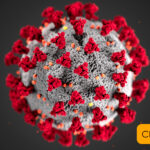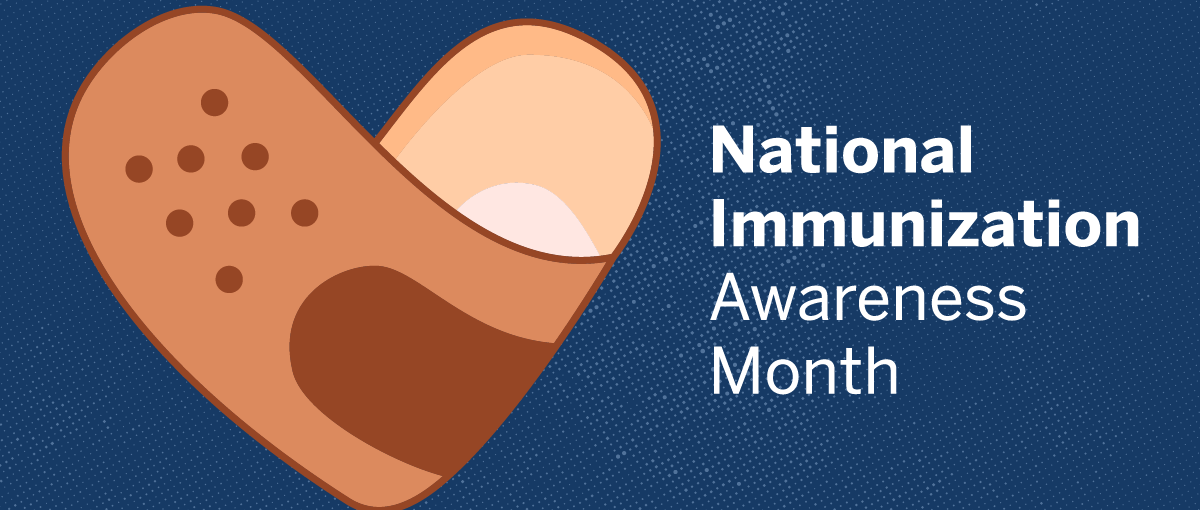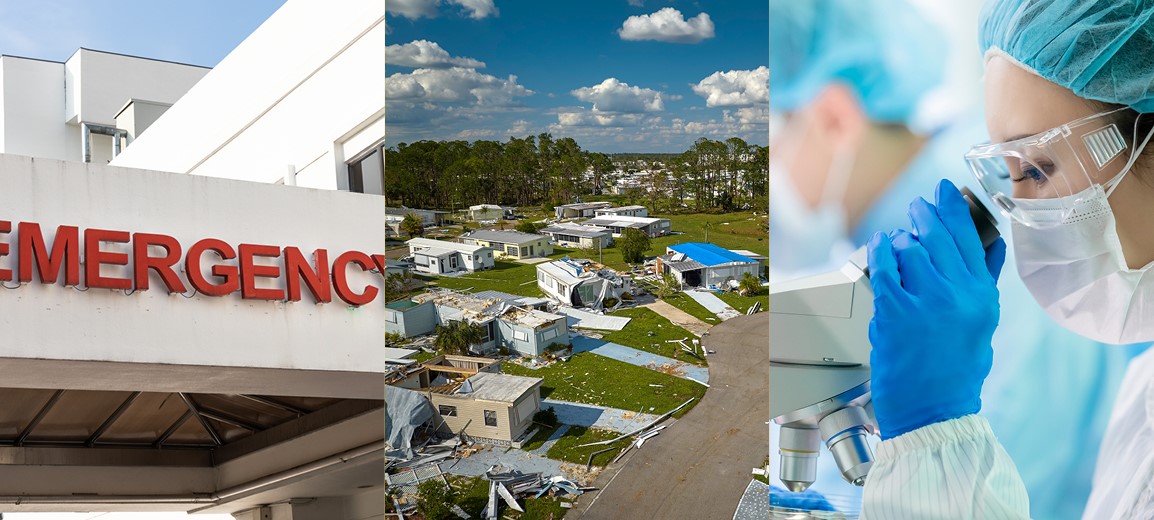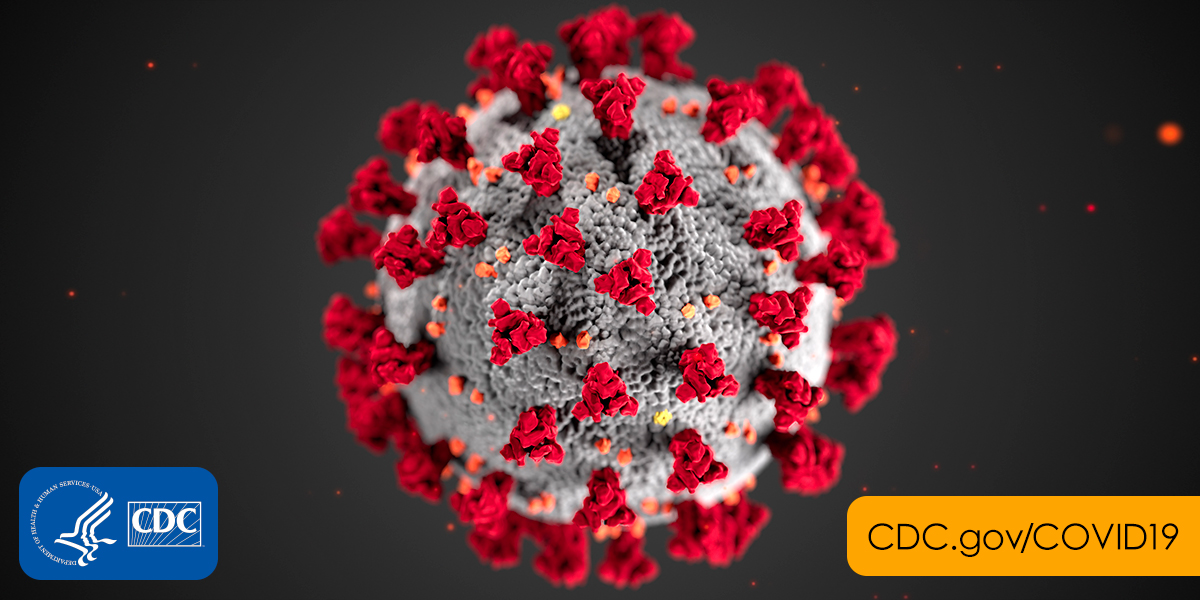Issue Category: Infectious Disease
August is National Immunization Awareness Month
August is National Immunization Awareness Month. This annual observance is designed to remind everyone that staying up to date on vaccinations is an important way to protect not only their health but the health of everyone around them.
Vaccines are a public health success story. Today, we are fortunate to have a broad spectrum of safe and effective vaccines, which if received on schedule, protect patients of all ages against vaccine-preventable diseases. Current vaccines protect against childhood disease including chicken pox, measles, and whooping cough, while protecting adults from the flu, Tdap, and shingles. Vaccines have also eradicated or nearly eradicated life-threatening diseases, such as smallpox and polio.
Children as young as 1-2 months old should be vaccinated against childhood illnesses and school-age children may need vaccine updates before they can return to school this fall. Ensuring that every child sees their doctor for a well-child visit and to receive any needed vaccine or vaccine updates is one of the best ways a parent can protect their child’s health and that of the community. Because the immunity created by a vaccine can lessen overtime, it’s important that children receive their vaccines on the recommended schedule. Adults may also need vaccine updates or to receive recently approved vaccines such as the RSV vaccine for adults 60 years of age and older.
During the COVID-19 pandemic, routine childhood vaccination levels among school-age children in the U.S. decreased, likely due to missed well-child medical visits. Globally, a report by UNICEF and the World Health Organization found that childhood vaccination coverage worldwide increased with about 4 million more children receiving full immunizations in 2022 compared to 2021, but were still below pre-pandemic levels.
Vaccines meet strict safety and effectiveness measures
In the U.S., safety measures are strict and prioritized to ensure that vaccines are safe for patients. Before any vaccine is approved for use, it is tested for safety and effectiveness through clinical trials and then must be approved by the Food and Drug Administration (FDA) and recommended by the Center for Disease Control and Prevention’s (CDC) Advisory Committee on Immunization Practices. While some people experience mild side effects after receiving a vaccine, such as swelling at the shot area, mild fevers and chills, serious reactions are extremely rare. Overall, the safety of all vaccines is closely monitored to ensure their continued safe use. If patients have questions about a vaccine including any potential side effects, they should speak to their healthcare provider.
Unseen Guardians: Measles Outbreak Highlights Public Health’s Crucial Role and Evolving Challenges
Local health officials and CDC work together to stamp out Ohio measles outbreak
In 1912, the United States formally recognized measles—a highly contagious viral infection causing fever, cough, runny nose, red eyes, and a characteristic rash in milder cases, while leading to pneumonia, encephalitis, and death in more severe instances—as a nationally notifiable disease. For centuries, this ubiquitous childhood ailment afflicted millions. In the first decade of reporting, an annual average of 6,000 measles-related fatalities were recorded in the U.S.
The introduction of the first measles vaccine in 1963, with its near-perfect efficacy, marked a turning point. The vaccine was later combined with those for mumps and rubella (MMR) in 1971, and varicella (MMRV) in 2005, providing children protection against several diseases in a single shot. Bolstered by this potent new preventive tool, the Centers for Disease Control and Prevention (CDC) set a goal in 1978 to eliminate measles from the country. This objective was realized in 2000, thanks to robust vaccination campaigns, the introduction of a second dose in 1989 to increase efficacy, and rigorous disease surveillance systems.
In the new millennium, measles appeared a relic of the past, but the specter of outbreaks returned—first in the 2014-15 Disneyland episode, and then in the largest outbreak in decades in 2019. Declining vaccination rates, fueled by skepticism and misinformation, left vulnerable communities exposed. The 2019 outbreak primarily affected unvaccinated children in communities with low vaccination rates across 31 states, such as ultra-Orthodox Jewish communities in New York and vaccine hesitant regions in Washington. Travelers imported the virus, sparking infections among the unvaccinated.
One such measles outbreak erupted in Ohio in 2022. Between November 2022 and February 2023, when the outbreak was declared over, 85 cases were reported, primarily affecting children under five, with 36 hospitalizations. Among the 85 cases, 80 were unvaccinated, including 25 infants too young to receive their first dose.
To quell the outbreak, a team of epidemiologists from the CDC worked in concert with Columbus Public Health to track cases, identify and notify exposed residents, and understand the spread of the virus. Dr. Mysheika Roberts, Columbus’s health commissioner, led the outbreak response, raising awareness of the disease through public information and education, and promoting and easing access to vaccination.
In addition to the on-the-ground work of state and local health departments, the CDC plays a vital, often behind-the-scenes role in supporting those departments and safeguarding public health. It provides robust disease surveillance systems, expert guidance, technical assistance, and financial support, enabling locally targeted interventions and infrastructure improvements.
Though the latest outbreak was successfully contained, the Ohio measles episode may portend further challenges. Vaccine hesitancy, a complex and deeply ingrained phenomenon, threatens to erode hard-won public health gains and could precipitate resurgent outbreaks. The issue has multifaceted roots including mistrust in science and institutions, and misinformation amplified on digital platforms. In communities of color, vaccine hesitancy is compounded by longstanding health disparities and medical mistreatment.
The COVID-19 pandemic exacerbated the problem, with routine vaccination rates falling due to school closures and disrupted well-child doctor visits. A recent Kaiser Family Foundation poll revealed that, amid the politicization of COVID-19 vaccines and school mandates, over a third of parents with children under 18 believe they should have the choice to not vaccinate their children against measles, mumps, and rubella, even at the risk of others’ health. This represents a 52% increase compared to 2019. During the 2021-22 school year, kindergarten vaccination coverage fell to roughly 93%, leaving about 250,000 kindergartners potentially unprotected against measles.
Tackling vaccine hesitancy and strengthening our public health systems requires a multifaceted national approach. Federal, state, and local governments should invest in accessible, science-based education campaigns that dispel myths and foster trust. Working with local partners, public health agencies are developing tailored, culturally sensitive vaccine education and access programs that bridge gaps in understanding and acceptance.
The Ohio measles outbreak serves as a stark reminder that the fight against vaccine-preventable diseases remains ongoing, the indispensable role of the public health workforce, and the critical need for a robust public health system. Increased, sustained, and flexible public health funding is key to having such a system. As is growing a diverse workforce to ensure that those shaping policy and delivering services reflect the communities they serve. By taking these steps, among others, we can reduce vaccine hesitancy, create a more robust public health system, and foster an environment of trust in science. Doing so can protect the hard-won progress made against measles and other diseases, safeguard the health and well-being of generations to come, and pave the way for a more equitable future.
Ready or Not 2023: Protecting the Public’s Health from Diseases, Disasters, and Bioterrorism
COVID-19 and Drug Overdose Deaths Drive U.S. Life Expectancy Down
(Washington, DC – January 17, 2023) — Data released by the Centers for Disease Control and Prevention in December 2022 showed that U.S. life expectancy decreased from 77 years in 2020 to 76.4 years in 2021, the second consecutive year that U.S. life expectancy decreased. The last time the U.S. experienced a two-year decrease in life expectancy was during World War II.
Age-specific death rates from 2020 to 2021 increased for all age groups other than infants less than one year old. American Indian and Alaska Native females experienced the largest increase in death rates, jumping 7.3 percent in 2021. Lower life expectancy for some populations groups, disproportionately among people of color, have been attributed to the structural inequities and barriers to optimal health that those communities experience.
Heart disease remained the leading cause of death in the U.S. during 2021 followed by cancer and COVID-19. In addition, drug overdose accounted for over a third of all unintentional deaths. During 2021, 106,699 people died in the U.S. due to a drug overdose, a 14 percent increase in the overdose death rate over 2020.
“These data underscore the importance of TFAH’s work to advance public health, prevention, and health equity,” said TFAH President and CEO J. Nadine Gracia, MD, MSCE. “The COVID-19 pandemic has highlighted the impact of social and economic conditions on people’s health and a community’s ability to be resilient during an emergency. TFAH will remain steadfast in advocating for policies that promote optimal health and well-being for every person and community. Among our priorities are supporting policies and programs that will strengthen the nation’s public health workforce and data systems; investment in substance misuse and suicide prevention including school-based mental health services and primary prevention programs; increased investments in chronic disease prevention programs including obesity prevention; and addressing the social determinants of health.”
Learn more about the causes of declining U.S. life expectancy in this TFAH issue brief: U.S. Experienced Steepest Two-year Decline in Life Expectancy in a Century – TFAH
For more on TFAH’s recommendations to improve the nation’s emergency preparedness: Ready or Not 2022: Protecting the Public’s Health from Diseases, Disasters, and Bioterrorism – TFAH
For more on TFAH’s recommendations on needed investments in the nation’s public health system: The Impact of Chronic Underfunding on America’s Public Health System: Trends, Risks, and Recommendations, 2022 – TFAH
For more on TFAH’s recommendations on addressing the nation’s drug, alcohol and suicide crisis: Pain in the Nation 2022: U.S. Experienced Highest Ever Combined Rates of Deaths Due to Alcohol, Drugs, and Suicide During the First Year of the COVID-19 Pandemic – TFAH
For more on TFAH’s recommendations to address the nation’s obesity crisis: State of Obesity 2022: Better Policies for a Healthier America – TFAH
TFAH’s Portal of COVID-19 Resources
The following is a list of TFAH resources and documents related to the novel coronavirus read of COVID-19 and better equip the nation’s public health system to deal with this and future health emergencies.
Press Releases and Statements
20 Public Health Organizations Condemn Herd Immunity Scheme for Controlling Spread of SARS-CoV-2 The virus that causes COVID-19 has infected at least 7.8 million people in the United States and 38 million worldwide. It has led to over 215,000 deaths domestically, and more than 1 million globally – with deaths continuing to climb… read more (October 14, 2020)
Newly Announced Order for Hospitals to Bypass CDC and Send Coronavirus Patient Information Directly to Washington Database Likely to Worsen Pandemic Response Rather than Improve It The U.S. Centers for Disease Control and Prevention (CDC), as the nation’s lead public health agency, is uniquely qualified to collect, analyze and disseminate information regarding infectious diseases… read more (July 16, 2020)
Nearly 350 Public Health Organizations Implore HHS Secretary Azar to Support CDC’s Critical Role in the COVID-19 Pandemic Response The expertise of the U.S. Centers for Disease Control and Prevention (CDC) and all public health agencies is critical to protecting Americans’ health during the COVID-19 crisis, said a letter to Health and Human Services Secretary Alex Azar from 347 health and public health organizations released today… read more (July 7, 2020)
Public Health Needs Our Support “As our nation’s struggles to manage the continued surge of COVID-19 cases, we need to strengthen the public health response… read more (June 23, 2020)
Summary of CDC Morbidity and Mortality Weekly Report on COVID-19 Impact Patterns This is the first data reported on U.S. patients and is consistent with findings from other countries. Key takeaways… read more (March 31, 2020)
Trust for America’s Health Statement in Response to Congressional Passage of the Coronavirus Aid, Relief, and Economic Security Act (“CARES Act”)
“Congress took an important step today to begin giving public health the resources it needs now to respond to the COVID-19 pandemic. We are seeing in real-time the impact of the chipping away at public health budgets over the past 15 years… read more (March 27, 2020)
Cross-Sector Group of Eighty-eight Organizations Calls on Congress to Address Americans’ Mental Health and Substance Misuse Treatment Needs as Part of COVID-19 Response
A cross-sector group of 88 organizations from the mental health and substance misuse, public health and patient-advocacy sectors are jointly calling on the Trump Administration and Congress to address the immediate and long term mental health and substance misuse treatment needs of all Americans as part of their COVID-19 response… read more (March 20, 2020)
55 Organizations Call for Passage and Fast Implementation of Paid Sick Leave for all Workers as a Critical Part of COVID-19 Response
A cross-sector group of 55 public health, health, labor, business, and social policy organizations are jointly calling on the Trump Administration and Congress to pass and quickly implement a federal paid sick leave law that provides 14 days of such leave to all workers, available immediately… read more (March 13, 2020)
TFAH Applauds Passage of Supplemental Funding for COVID-19 Response: Now Funding Must Move Quickly to States and Other Entities
TFAH applauds Congress’ fast action in approving the Coronavirus Preparedness and Response Supplemental Appropriations Act (H.R 6074). We now call on the tasked federal agencies to move quickly to send the appropriated monies to the agencies and localities working at the frontlines of the COVID-19 crisis… read more (March 5, 2020)
TFAH Statement on COVID-19 Preparations
Now that the U.S. has transitioned from the planning phase to the response phase of the COVID-19 outbreak, the Federal Executive Branch and Congress as well as state and local governments and other stakeholders should prioritize… read more (March 3, 2020)
Congressional Testimony and Sign-on Letters
- 200+ Groups Support Public Health Infrastructure Saves Lives Act in Infrastructure Bill (June 23, 2021)
- Dr. J. Nadine Gracia’s written testimony before the House Energy & Commerce Subcommittee on Oversight & Investigations (May 26, 2021)
- Public Health Infrastructure Fact Sheet (May 11, 2021)
- 76 Organizations Applaud American Rescue Package Attention to Public Health and Call for Emphasis on Health Equity in Funding Decisions (March 24, 2021)
- 316 Groups Call for Sustained Funding for Public Health Infrastructure (February 12, 2021)
- Comment Letter from Asian & Pacific Islander American Health Forum – and – Trust for America’s Health (January 28, 2021)
- TFAH Statement for Senate Homeland Security and Governmental Affairs Committee Hearing on COVID-19 Therapeutics (December 8, 2020)
- Sign-on Letter to FDA on Safety & Efficacy of COVID Vaccine (September 17, 2020)
- TFAH’s comments on NASEM Vaccine Discussion (September 4, 2020)
- 235 health groups urge VP Pence and White House Coronavirus Task Force to reverse changes to CDC COVID testing guidelines (September 3, 2020)
- 350+ Groups Sign-on in Support of CDC Mission (July 7, 2020)
- 250+ Groups Sign-on in Support Investment in Public Health Infrastructure (July 2, 2020)
- Written Statement for House Ways & Means Committee Hearing on COVID-19 and Communities of Color (May 27, 2020)
- IDSA, TFAH and Vaccinate Your Family lead letter calling for US engagement on global vaccine work (May 21, 2020)
- TFAH and Asian Pacific Islander American Health Forum to HHS and to Congress to address COVID data equity issues (May 4, 2020)
- Public Health, Medical Associations Call on Federal Authorities, State and Local Governments to Prioritize Safety in COVID-19 Policies (April 29, 2020)
- TFAH joins 1000+ organizations and individuals from around the World urging the administration to fund WHO (April 24, 2020)
- TFAH’s letter on our priorities for the next bill (April 3, 2020)
- Letter from 160 organizations in support of long-term investment in public health infrastructure, Co-Led with ASTHO, NACCHO, and APHA. (April 3, 2020)
- Letter from Infectious Disease Doctors and Others Supporting Strengthening Social Distancing Guidelines (March 30, 2020)
- 36 Groups Call for the Prioritization of Older Adults’ Needs During COVID-19 Response (March 27, 2020)
- Letter from 90+ Groups Calling for Public Health Infrastructure Funding in COVID Bill (March 20, 2020)
- TFAH is one of 88 Organizations Call for Attention to Mental Health and Substance Misuse Treatment as Part of COVID-19 Response (March 20, 2020)
- TFAH is one of 55 Groups Call for Paid Sick Leave as Critical Part of COVID-19 response (March 13, 2020)
- Dr. J. Nadine Gracia written testimony before the House Committee on Homeland Security, Subcommittee on Emergency Preparedness, Response, and Recovery. (March 10, 2020)
Commentaries and Op-Eds
- Polio, Chickenpox, Measles… Covid-19? The Case for Vaccine Mandates in Schools, The New York Times (February 7, 2022)
- A Pandemic Shows Why the United States Should not be One of Only 11 Nations Without Paid Sick Leave, The Washington Post (January 15, 2022)
- Omnicron is Here. Will We Use Our New COVID Drugs Wisely?, The New York Times (December 1, 2021)
- Has Congress Learned Nothing About How to Deal with a Pandemic?, Catherine Rampell, The Washington Post (August 2, 2021)
- Ensuring COVID-19 Vaccine Access for Homebound Older Adults , John Auerbach and Megan Wolfe, Milbank Memorial Fund (April 9, 2021)
- COVID-19 Can Bring a New Era of Public Health Leadership. But Will It?, Marian W. Wentworth, STAT News (March 5, 2021)
- COVID Recovery Requires Addressing Economic Inequities, Richard E. Besser, The Hill (March 4, 2021)
- How to Handle the Covid-19 Vaccine Breakthrough the Right Way, Tom Frieden, The Wall Street Journal (December 4, 2020)
- What the New Administration Must Do On Day One to Tackle COVID-19, Terry Adirim, Health Affairs, (November 12, 2020)
- America’s Last Line of Defense for a Safe Vaccine, Julie Morita and Edward Belongia, Scientific American, (October 19, 2020)
- The Key to Efficient Vaccine Distribution: Start Preparing Early, John Auerbach and David Lackey, STAT News (September 14, 2020)
- We Need a Vaccine Distribution Plan — Right Now, Julie Morita, CNN. (August 16, 2020)
- We Ran The CDC. No President has ever Politicized its Science the Way Trump has, Tom Frieden, Jeffrey Koplan, David Satcher and Richard Besser, The Washington Post. (July 14, 2020)
- NYC to USA Slow the COVID Monster While You Can, Dr. Raul Perea-Henze. (July 10, 2020)
- COVID-19’s Disproportionate Impact on Communities of Color Spotlights the Nation’s Systemic Inequities, Dr. J. Nadine Gracia, Journal of Public Health Management and Practice. (July 6, 2020)
- State and Territorial Health Officials to the American Public: COVID-19 is Not Over, Association of State and Health Officials. (June 23, 2020)
- New Report Shows Uneven COVID-19 Response was Years in the Making Due to Chronic Underfunding of Public Health, by John Auerbach, Coalition for Health Funding blog. (April 21, 2020)
-
Good, a COVID-19 Vaccine is in Development. Will it Be Accessible to all Americans? Cecelia Thomas and Amy Pisani. Health Affairs blog, April 20, 2020.
- When you drown the government in a bathtub, people die by Dana Millbank, The Washington Post. (April 10, 2020)
-
The U.S. Approach to Public Health: Neglect, Panic, Repeat. Time to give new life to an old idea: A strong public health system is the best guarantor of good health. by Jeneen Interlandi, New York Times editorial board. ( April 9, 2020)
-
COVID-19 Exposes the Cracks in our Already Fragile Mental Health System, by John Auerbach and Benjamin Miller American Journal of Public Health. (March 28, 2020)
- Containing the Coronavirus: Paid Sick Leave Policies Could Fall Short by TFAH’s Adam Lustig and Marilyn Cabrera, The Milbank Quarterly (March 18, 2020)
- Want to Make The Nation More Prepared to Fight Contagious Diseases? Expand Paid Sick Leave. Health Affairs by John Auerbach, TFAH President and CEO and Brian Castrucci, President and CEO of de Beaumont Foundation (March 17, 2020)
- Efforts Needed to Ensure Protecting Older Adults from COVID-19 Don’t Create Other Problems. by John Auerbach and Megan Wolfe, Aging Today, American Society on Aging (March 2020)
Additional News Coverage We Recommend
Coronavirus in the U.S.: Latest Map and Case Countas compiled by the New York Times |
- U.S. Has Far Higher Covid Death Rate Than Other Wealthy Countries, The New York Times (February 1, 2022)
- Preventing the Next Pandemic Requires a Health Overhaul, The Washington Post (January 26, 2022)
- More Countries Switch to a Self-Administered Antigen Test in a Race to Stop Omicron, The New York Times (January 2, 2022)
- Much has Changed Since the Start of the Pandemic. But the Nation’s Public Health System Remains Fractured, The Washington Post (January 1, 2022)
- Fronts-line Workers Describe How Vaccination Affects in Latest COVID Wave, NBC News (December 29, 2021)
- COVID Helped Cause the Biggest Drop in U.S. Life Expectancy Since WWII, PBS News Hour (December 22, 2021)
- The Pandemics Next Turn Hinges on Three Unknowns, The Atlantic (November 18, 2021)
- Another Struggle for Long COVID Patients: Disability Benefits, The New York Times (October 27, 2021)
- Can the Pandemic Push U.S. Public Health in a Positive Direction?, Greater Good Magazine (June 1, 2021)
- Data and Door Knocking: One City’s Push for Racial Equity in Vaccines, Tradeoffs, (March 4, 2021)
- New CDC Director Outlines 6 Big Fixes Needed to Crush COVID-19, Tanya Albert Henry, AMA (January 28, 2021)
- Low Flu Vaccines Rates in Rural U.S. are Challenge for COVID-19 Vaccine, Aleszu Bajak and Joe Sneve, USA Today (December 6, 2020)
- What Places Are Hardest Hit by the Coronavirus? It Depends on the Measure, Mitch Smith, Amy Harmon, Lucy Tompkins and Thomas Fuller, The New York Times (November 12, 2020)
- America had the World’s Best Pandemic Response Plan. Why Did it Fail?, Mark Johnson, Milwaukee Journal Sentinel, (October 14, 2020)
- As CDC’s Deadline for Submitting COVID-19 Vaccine Distribution Plans Nears, States Say They’re Still Short on Guidance, Gaby Galvin, Morning Consult (October 9, 2020)
- Experts See Progress on a COVID -19 Vaccine, but Worry About Who Gets It First and How It Gets To Them, Elizabeth Weise and Karen Weintraub, USA Today (August 26, 2020)
- The Fullest Look Yet at Racial Inequity of Coronavirus, Richard A. Oppel Jr., Robert Gebeloff, Rebecca Lai, Will Wright, and Mitch Smith, The New York Times (July 5, 2020)
- Hollowed Out Public Health System Faces More Cuts, by Lauren Weber, Laura Ungar, Michelle R. Smith, Hannah Recht and Anna Maria Barry-Jester, AP News (July 1, 2020)
- How Data Became One of the Most Powerful Tools to Fight an Epidemic, by Steven Johnson, The New York Times (June 10, 2020)
- Decades of Yo-Yo Funding Hampering Covid-19 Response, by Jeannie Baumann, Bloomberg Law (June 9, 2020)
- Federal Funding for State and Local Contact Tracing Efforts is an Urgent Priority, And A Bargain, by Joshua A. Solomon and Arthur L. Reingold Health Affairs (May 11, 2020)
- An Army of Virus Tracers Takes Shape in Massachusetts by Ellen Barry, The New York Times (April 17, 2020)
- Policy Decisions and Use of Information Technology to Fight Novel Coronavirus Disease, Taiwan. CDC’s Emerging Infectious Diseases. (July 2020, early release)
-
Health Issues for Blacks, Latinos and Native Americans may cause coronavirus to ravage communities, by Deborah Barfield Berry, USA Today (March 31, 2020)
- ‘There’s no Surge Plan’: Despite Warnings, Congress Failed to Fully Fund Pandemics Bill by Alice Miranda Ollstein, Politico (March 28, 2020)
- The Virus Can Be Stopped, But Only With Harsh Steps Experts Say by Donald G. McNeil Jr., The New York Times (March 26, 2020)
- The Coronavirus Is Here, So What Happens Next? by Ezekiel J. Emmanuel, Susan Ellenberg & Michael Levy, The New York Times (March 17, 2020)
- Coronavirus: Will the U.S. be Ready in the Weeks Ahead? by Ritu Prasad, BBC News (March 17, 2020)
- As Coronavirus Deepens Inequality, Inequality Worsens Its Spread by Max Fisher & Emma Bubola, The New York Times (March 16, 2020)
- Trump’s State of Emergency Is an Admission of Failure by the U.S. Government by W.J. Hennigan, TIME (March 13, 2020)
- Health Agencies Tackle Coronavirus Epidemic with Dwindling Resources by David Harrison, The Wall Street Journal (March 9, 2020)
 |
CDC COVID-19 Information Resources |
COVID-19 and Response: Webinars and Briefings
- Ready or Not 2021: Protecting the Public’s Health from Diseases, Disasters, and Bioterrorism
- COVID-19 Vaccine for Homebound Older Adults: Challenges and Solutions
- Ending the Triple Pandemic: Advancing Racial Equity by Promoting Health, Economic Opportunity and Criminal Justice Reform
- TFAH’s Webinars/Briefings
Related Reports
- The Impact of Chronic Underfunding on America’s Public Health Systems: Trends, Risks, and Recommendations 2021
- Ensuring Access to Vaccines for Older Adults and People with Disabilities Who are Homebound
- Building Trust in and Access to COVID-19 Vaccine Within Communities of Color and Tribal Nations
- COVID-19 Equity Fact Sheet
- Beyond School Walls: How Federal, State and Local Entities are Adapting Policies to Ensure Student Access to Healthy Meals During the COVID-19 Pandemic
- COVID-19 Policy Response Brief
- Proposal: Core Public Health Infrastructure Program
- COVID-19 Policy Response Brief
- Ready or Not 2020: Protecting the Public’s Health from Diseases, Disasters, and Bioterrorism
- The Impact of Chronic Underfunding of America’s Public Health System: Trends, Risks, and Recommendations, 2020
Ready or Not 2022 Policy Fact Sheet
TFAH Recognizes National Minority Health Month
Trust for America’s Health (TFAH) is proud to support National Minority Health Month (NMHM) 2022 and its critical focus on addressing health inequities. This year’s NMHM theme Give Your Community a Boost! notes the importance of ensuring that everyone eligible to receive the COVID-19 vaccine is vaccinated, including all eligible booster doses. Being vaccinated is the best way to protect yourself and your loved ones against severe illness from COVID-19.
“Ensuring that communities of color have equitable access to and reliable sources of information about the COVID-19 vaccine is vital to promoting and protecting the health and well-being of the community,” said TFAH President and CEO, Dr. J. Nadine Gracia. “People of color have been disproportionately impacted by the pandemic, due to longstanding social, economic, and health inequities that led to higher rates of job loss, less access to essential resources for remote learning, and higher rates of infections, hospitalizations, and deaths. We need to focus on two priorities: protecting everyone from COVID-19 now and ensuring that no community is at heightened risk during the next public health emergency. ”
Additional Readings:
TFAH’s 2020 policy brief Building Trust in and Access to a COVID-19 Vaccine Within Communities of Color and Tribal Nations reports on challenges to building vaccine trust and access in communities of color and tribal communities and recommends solutions.
TFAH’s 2022 Ready or Not: Protecting the Public’s Health from Diseases, Disasters, and Bioterrorism reports on state-level public health emergency readiness and the connection between health equity and emergency preparedness.
TFAH’s Leveraging Evidence-Based Policies to Improve Health, Control Costs, and Create Health Equity recommends policy action that if adopted will address the social determinants of health that currently drive poor health in many communities.
Read more about TFAH’s policy recommendations to rebuild the nation’s public health system and invest in the social determinants of health and health equity in our Blueprint report: The Promise of Good Health for All: Transforming Public Health in America. A Blueprint for the 2021 Administration and Congress.
Congressional Briefing and National Webinar: Ready or Not 2022: Protecting the Public’s Health from Diseases, Disasters, and Bioterrorism
As the nation enters its third year of the COVID-19 pandemic, this year’s report calls for urgent investment to create a public health system able to protect all Americans’ health during emergencies. The report measures states’ degree of preparedness to respond to a wide spectrum of health emergencies and to provide ongoing public health services.
A panel of subject matter experts discussed the nation’s readiness for public health emergencies, examined the findings of the report, and discussed key recommendations for policymakers.
Resources:
Trust for America’s Health
- Ready or Not 2022 Fact Sheet
- Ready or Not 2022: Protecting the Public’s Health from Diseases, Disasters, and Bioterrorism report
Office of Minority Health, Centers for Disease Control and Prevention
- Health Equity Matters e-newsletter
- Health Matters for Women e-newsletter
- Health Equity in Action
- Racism & Health
- Conversations in Health Equity Blog
- COVID-19 Health Equity Strategy
- COVID-19 Vaccine Equity for Racial & Ethnic Minority Communities
Articles shared by Céline Gounder, MD, ScM, FIDSA
- A National Strategy for the “New Normal” of Life with COVID
- To Get To A ‘New Normal,’ Public Health Must Focus On All Respiratory Viruses
- How America Can Rebuild the Community Bonds It Needs to Face the Next Pandemic
- Pandemic Preparedness and COVID-19: An Exploratory Analysis of Infection and Fatality Rates, and Contextual Factors Associated with Preparedness in 177 Countries, from Jan 1, 2020, to Sept 30 2021
- We Have a Once-in-a-Generation Opportunity to Fix our Crumbling Schools
- Opinion: How Can We Put Covid Behind Us Without Guaranteed Paid Sick Leave?
- The Death Toll Says It All
- The End of the Covid Emergency Could Mean a Huge Loss of Health Insurance
The Challenge of Vaccine Hesitancy Didn’t Start with COVID-19, and it Won’t End There
Will COVID-19 Vaccine Misinformation Lead to More Measles, Flu and Shingles?
Cecelia Thomas, JD
Just over one year has passed since the first availability of the COVID-19 vaccine. At this one-year mark 63 percent of U.S. adults are fully vaccinated. This ranks the United States as 60th in the world based on the percentage of fully vaccinated individuals. To say that these rates are troubling is an understatement. Even before the COVID-19 pandemic, the World Health Organization named vaccine hesitancy, the reluctance or refusal to vaccinate despite the availability of vaccines, as one of the top ten threats to global health. The consequences of this threat are tragically apparent with the deaths of mostly unvaccinated Americans. High levels of vaccine hesitancy have slowed the world’s ability to move past the pandemic and may be what’s allowed new variants of the virus to emerge. Without addressing the root causes of vaccine hesitancy, more preventable infectious disease outbreaks will occur, and they will cost thousands of more lives in addition to further social and economic disruption.
Reasons for Vaccine Hesitancy
The problem of vaccine hesitancy did not start with COVID-19 and it likely won’t end there. In communities of color, vaccine hesitancy stems from long-standing health disparities and medical mistreatment . These deep and painful roots in this country’s history are exacerbated by the persistence of racial discrimination and bias in healthcare today and by practical barriers to vaccination such as health coverage limitations, inadequate transportation, and insufficient paid time off. While communities of color and low-income communities have had the most pervasive vaccine hesitancy historically, these groups are far from the only groups driving current vaccine hesitancy.
Efforts to rectify these past and present injustices should focus on cultural competence training for medical providers and community leaders on issues related to COVID-19 and routine vaccinations for children and adults. In addition, we need to improve vaccine accessibility and transparency. Other groups, other than populations that are systematically marginalized, such as white Evangelical Christians, have also expressed high rates of vaccine hesitancy before and throughout the pandemic. The politicization of public health that occurred during the last election intensified anti-vaccine sentiments, while social media and other platforms have allowed for the increased spread of misinformation.
Addressing Vaccine Hesitancy through Policy
Congress has recently passed legislation to fund fortified public health infrastructure to conduct and support widespread outreach, engagement, and vaccinations to communities across the nation. In addition, the COVID-19 Health Equity Task Force served as a forum for experts in the field to comprehensively address disparities in pandemic-related inequalities and develop solutions to issues such as vaccine accessibility and hesitancy. These are crucial steps at the federal level. States should follow suit with steps to bolster vaccination access and education. Vaccine mandate bans are a step in the wrong direction and bad public policy.
Long-term Impacts of Vaccine Hesitancy
The U.S. also remains vulnerable to vaccine-preventable diseases such as flu, hepatitis B, pneumococcal, and shingles, due to under-vaccination. The threat of increased hesitance could further endanger people at higher risk for severe outcomes including older adults and people with underlying health conditions. A year before the pandemic, the U.S. was in the midst of its worst measles outbreak in two decades and just narrowly preserved its measles elimination status. The seasonal flu vaccine has also remained significantly underutilized in recent years. The lowest flu vaccination rate in recent years, 42% during the 2017-2018 flu season, contributed to 2017-2018 being the deadliest flu season in 40 years with 80,000 deaths. Despite this tragic reality check, the flu vaccination rate has yet to increase past 49% . If vaccination rates for diseases such as the seasonal flu do not improve, the combined burden of these infectious diseases will further strain the healthcare system and cause needless death and illness. There has also been a significant drop in routine vaccination rates across all ages due to the pandemic. Adult vaccination rates are already far below Healthy People 2030 goals pre-pandemic and an estimated 26 million doses for adults and adolescents were missed in 2020.
Looking Forward
Congress, the Biden Administration and public health advocates must continue to work on immunization catch-up and support efforts to maintain high immunization coverage rates. These efforts are especially critical for the communities most impacted by COVID-19, such as communities of color and children. In October 2020, Trust for America’s Health co-hosted a national convening on building vaccine confidence and ensuring equitable access to the COVID-19 vaccine in communities of color, in partnership with the National Medical Association and UnidosUS. The policy recommendations of this report apply to other groups with growing rates of vaccine hesitancy, such as people who identify as politically conservative. Recommendations from the resulting policy brief also extend beyond the COVID-19 vaccine:
- Expanding federal funding to support and strengthen national, state, local, Tribal and territorial work on equitable and effective vaccination planning, communications, distribution and administration, including funding to support vaccine distribution at the local level and by community-based organizations;
- Collaborating with trusted community messengers/leaders for vaccine administration and education;
- Creating culturally and linguistically appropriate vaccine education;
- Ensuring zero out-of-pocket costs for individuals receiving recommended vaccines; and
- Collecting complete disaggregated racial and ethnic data on adverse experiences in healthcare as well as health outcomes.
While these recommendations are most immediately applicable to the COVID-19 pandemic, they will also be important to increasing vaccine trust in the future. These methods have already begun to work, vaccine hesitancy and racial gaps in vaccinations are beginning to slowly decrease. We must build on this momentum and prioritize increasing vaccine confidence across the U.S. to ensure that the nation is better prepared for future public health crises.
Cecelia Thomas, JD, is a Senior Government Relations Manager at Trust for America’s Health







